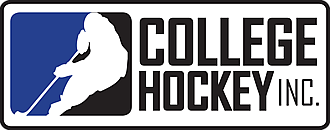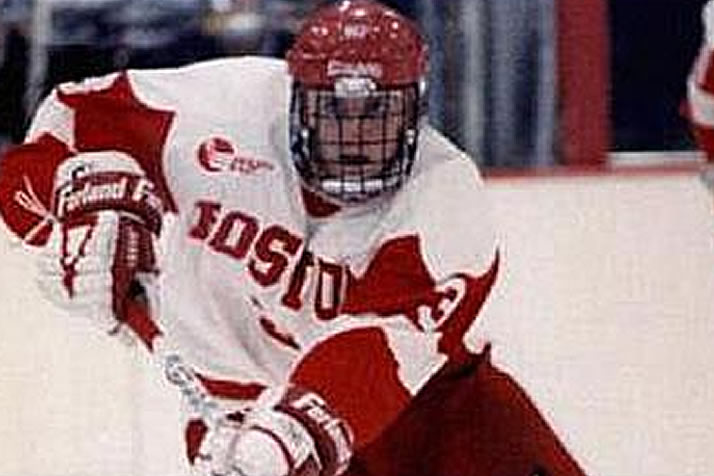


Amonte and LeClair earned their way to the top of one of hockey's most prestigious peaks due, in large part, to their roots in New England and niches in NCAA history.
"Being a Boston kid, you want to play college in the Boston area," said Amonte, who grew up in Hingham, Mass., and played alongside Jeremy Roenick at Thayer Academy. "I always wanted to play in the Beanpot. BU was the best fit, especially because of Jack (Parker, coach). Jack is the staple of the program and that's why people go there."
"He was one of those guys who made everyone else confident," Parker said of Amonte. "He wasn't a big guy, but very skilled and unbelievably competitive."
Polar opposite on the New England map but on the same parallel career-wise, LeClair grew up in St. Albans, Vt., 15 miles from the Canadian border and 90 minutes from the Montreal Forum, where he launched his NHL career.But that came after he played four seasons at the University of Vermont.
"Vermont's a huge part of this," said LeClair a few hours before his induction. "I had aspirations of playing college hockey since I was very young, and to be able to play in my backyard was a tremendous experience for me. I had a good feeling about that right away."
Legendary Catamounts coach Mike Gilligan has had that feeling for some 25 years running.
"John was my first big-time recruit, my first NHL draft recruit," said Gilligan, also on hand for the festivities. "It meant so much down the road, especially in the recruiting wars. Obviously, he was the biggest recruit out of the state of Vermont ever -- still is. I don't think we'll ever see that again.
"But he was responsible for having Martin St. Louis decide to come here and others like Tim Thomas, and a bunch of others followed in their footsteps. He's a legend around here still."
LeClair remains UVM's highest draft selection ever, taken at No. 33 in 1987 by Montreal. The quintessential power forward hoisted the Stanley Cup in 1993 with the Canadiens, his second pro season. He became the only American-born player to score 50 goals in three consecutive seasons (1995-98), playing on the "Legion of Doom" line in Philadelphia with Eric Lindros and Mikael Renberg after being traded to the Flyers by Montreal in February 1995.
Amonte's NCAA career spanned just two seasons from 1989-1991. But what a run it was.
Amonte registered 56 goals and 126 points in 79 games over two seasons, good for No. 14 all-time in Terrier goals and No. 7 in assists. BU won the Beanpot both years.
"He would have been BU's highest scorer," said Parker, "if he stayed all four years."
Amonte's last college game is indelibly etched in his heart and soul -- along with his winning goal in the 1996 World Cup-deciding game against Canada, and an Olympic silver medal in 2002.
Called by many college puck pundits the most exciting game in NCAA history, the 1991 title game on March 30 in St. Paul, Minn., had significant contributions by Amonte.
"That is definitely the most memorable game for me throughout my whole career," said Amonte. "Absolutely, the Northern Michigan game stands out."
BU jumped to a 3-0 lead in the first period, but the Wildcats responded with five goals in the second. With BU down 7-4 and 7:36 left in the game, Amonte, Keith Tkachuk and Shawn McEachern went to work.
Amonte at 12:24 from Tkachuk and McEachern made it 7-5; McEachern from Amonte at 14:59 made it a one-goal game. Then David Sacco from Scott LaChance and McEachern sent it to OT with 39 seconds left in regulation.
"We were so close with so many chances to put it away," said Amonte. "That was a forward's game for sure. At 8-7 there wasn't much defense going on."
Northern Michigan would win its only national championship 1:57 into the third OT. Shortly after, Amonte would make a bittersweet decision.
"Jack wanted to develop players who didn't have to go to the minors," said Amonte, who was taken 68th in the 1988 draft by the New York Rangers. "Neil Smith from the Rangers started calling, and at that time you couldn't have an agent, nobody to talk to. So it was just you and your father. My father didn't know much about the game, but he knew Neil Smith was calling from the Rangers; sounded like a good opportunity."
"'You better leave,' my dad said. Doug Weight and I signed on the same day. My father was the main ingredient in that decision. He chose wisely."
LeClair's four years at Vermont were interrupted by injuries his sophomore and junior seasons.
Nonetheless, he notched 56 goals and 60 assists for 116 points in 92 games. LeClair was named to the ECAC All-Rookie Team in 1988, leading the Catamounts to their first-ever NCAA Tournament appearance.
"Being a Boston kid, you want to play college in the Boston area. I always wanted to play in the Beanpot. BU was the best fit, especially because of Jack (Parker). Jack is the staple of the program and that's why people go there." -- Tony Amonte
LeClair was inducted into the UVM Athletic Hall of Fame in 2001 and was named to Vermont's All-Time Men's Hockey Team for "The ECAC Years" in 2006.
"Being able to make the NCAA Tournament was a big goal for us," said LeClair about his rookie season. "And to make it against Bowling Green was an accomplishment. But it being my freshman year, it would have been nice to go back.
"I didn't think of myself as a power forward at Vermont. I played center the first three years. My senior year, (Gilligan) put me on the wing. I got more chances and scored more goals.
"Then I started to picture myself playing like a Kevin Stevens or Cam Neely. Everybody wants to play like (Wayne) Gretzky or (Mario) Lemieux, but sometimes the physical things are different and not possible by some of us."
What was possible Tuesday night was the opportunity for Amonte and LeClair to say thanks to family, coaches and friends.
"I'm here tonight," said LeClair to his parents, "because of your sacrifices."
"(My dad) is the one I dedicate this award to," said an emotional Amonte about his recent loss. "My only regret is he's not here tonight."
Their respective NHL career ledgers read 1,174 games and 900 points for Amonte, and 967 games and 819 points for LeClair.
Most of Amonte's production came in Chicago from 1994-2002. He played one season each in Phoenix and Philadelphia (where he played with LeClair) before the lockout, and two in Calgary before retiring.
LeClair would play his final two seasons -- after the lockout -- in Pittsburgh.
"You knew about Tony," said LeClair about his fellow inductee. "He was a great college player. When he came to the Flyers he brought a lot of energy and set the standards for the young guys; a good role model. And he scored a lot of goals."
"LeClair was a workhorse," said Amonte. "Dedicated himself 100 percent to the game. He took the game very seriously and wanted to be the best player. On many nights he accomplished that. He was a power left wing, what every team dreamed of having. He was at the top for many years; the prototypical left wing. Power, speed, shot, could pass and see the ice. He had it all."
NCAA greats, memorable NHL careers, teammates in 2004 in Philadelphia, linemates on the 2006 World Cup team, shared silver in Salt Lake City in 2002, both retired in 2007.
Tony Amonte and John LeClair now share more common ground in Eveleth, Minn., at the U.S. Hockey Hall of Fame.